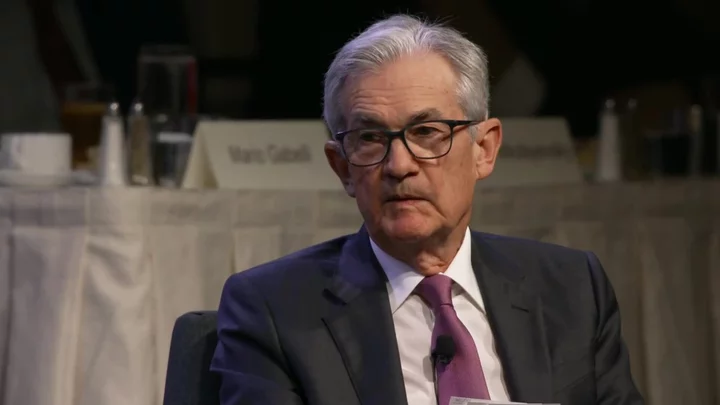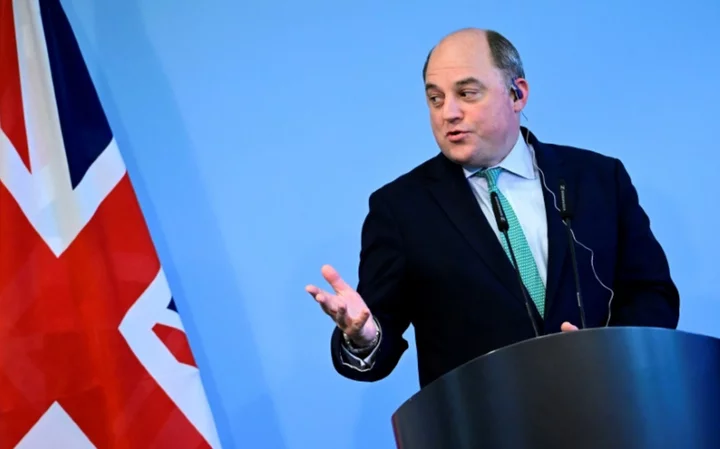Equities fell as volatility gripped global markets from an escalation in tensions in the Middle East, driving oil and gold to further advances. Treasuries advanced as buyers returned to the market.
European futures pointed to a weak start, set to track Asian peers lower. MSCI’s Asia Pacific Index - a gauge for benchmarks in the region - lost 0.3% and is heading for its biggest weekly drop in two months. Treasuries rose, led by gains in 10-year debt, as Federal Reserve Chairman Powell suggested the US central bank is inclined to hold interest rates steady again at its next meeting, while it watches key growth data. The dollar edged higher.
Oil traded over the $90-a-barrel mark and gold approached the $2,000-an-ounce level following a report US bases in Iraq and Syria were targeted in drone attacks. Investors were also on edge after an American destroyer in the Red Sea intercepted cruise missiles and drones fired toward Israel by Houthi rebels in Yemen.
“The risk premium in crude has shot up again,” said Vandana Hari, founder of consultancy Vanda Insights, citing the latest incidents including the missiles from Yemen. “As long as the Israel-Hamas tensions run high, crude will remain susceptible to further spikes on signs of an escalation.”
Elsewhere, China’s record injection of extra cash may offer support after the nation’s stocks erased all gains seen during their massive reopening rally that took off late last year. The economy has been challenged this year by a lack of demand and a downturn in the property market.
Still, Morgan Stanley advises against buying the dip in Chinese equities as market sentiment is likely to stay fragile while foreign fund outflow could persist near-term. Meanwhile, concerns around property sector lingered on with Country Garden Holdings Co. missing dollar bond interest payment.
READ: China’s Country Garden Default Is All But Official, Restructuring Looms
Gains in Treasuries came ahead of more speeches from Federal Reserve officials after Powell said it will proceed carefully with rate hikes, while citing evidence that policy isn’t “too tight.” Swaps trimmed the implied odds of another Fed rate increase to under 50%, and priced a start to cuts in July, compared with September previously.
Meanwhile, currency markets remain on tenterhooks as Japan’s finance minister Shunichi Suzuki said it was important the yen moved stably and in line with fundamentals, just as the currency approached 150 per dollar. Traders also monitored for unscheduled Bank of Japan bond buying operations as the 10-year yield neared 0.85%. Earlier, markets largely shrugged off Japan’s inflation that slid below 3% for the first time in more than a year.
Key events this week:
- Philadelphia Fed President Patrick Harker speaks, Friday
Some of the main moves in markets:
Stocks
- S&P 500 futures fell 0.2% as of 6:38 a.m. London time. The S&P 500 fell 0.9%
- Nasdaq 100 futures fell 0.4%. The Nasdaq 100 fell 0.9%
- Japan’s Topix fell 0.2%
- Hong Kong’s Hang Seng fell 0.5%
- The Shanghai Composite fell 0.6%
- Euro Stoxx 50 futures fell 0.7%
Currencies
- The Bloomberg Dollar Spot Index was little changed
- The euro was little changed at $1.0577
- The Japanese yen was little changed at 149.86 per dollar
- The offshore yuan was little changed at 7.3358 per dollar
- The Australian dollar fell 0.2% to $0.6318
- The British pound was little changed at $1.2136
Cryptocurrencies
- Bitcoin rose 1.6% to $29,186.53
- Ether rose 1% to $1,582.63
Bonds
- The yield on 10-year Treasuries declined five basis points to 4.94%
- Japan’s 10-year yield was little changed at 0.835%
- Australia’s 10-year yield declined four basis points to 4.75%
Commodities
- West Texas Intermediate crude rose 1.1% to $90.37 a barrel
- Spot gold rose 0.2% to $1,978.62 an ounce
This story was produced with the assistance of Bloomberg Automation.
--With assistance from Yongchang Chin.









